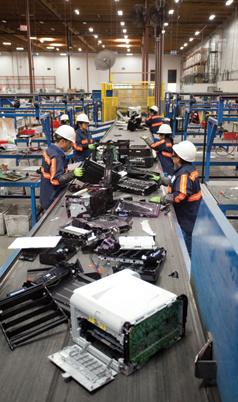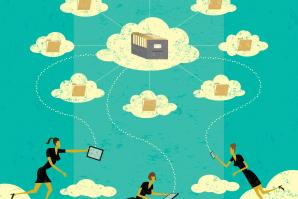If your IT room is starting to look like a scene out of “Sanford and Son,” you’re not alone. In 2010, American consumers and businesses unloaded 40 million computers onto recyclers, landfills and the refurbished market, the Golisano Institute for Sustainability in Rochester, N.Y., reports. Some estimates show, however, that millions more are idling in homes and offices because owners simply don’t know what to do with them.
Even if you don’t have an in-house tech guru, there’s a range of options for unloading your old hardware in the Capital Region. No matter where your old computers end up, tech experts everywhere agree on one thing: Wipe your data.
Workers process e-waste at Sims Recycling Solutions in Roseville

“If you donate, sometimes the nonprofit doesn’t even know where it’ll end up,” says Steve Skurnac, president of Sims Recycling Solutions, Americas. “They might end up selling it.”
Sims Recycling Solutions has a 200,000-square-foot facility in Rose-ville and a fleet of trucks that pick up e-waste around the Capital Region. The recycler will erase the old data if it’s selling the computer in the secondary market. Otherwise, the data is destroyed when workers dismantle the pieces and separate the commodities for resale, such as metals and plastics. Either way, you get a certificate of destruction when Sims picks up your old computers.
Generally, Sims doesn’t charge for pick up, but every situation is different. For example, it might be labor-intensive to remove a large mainframe. In some circumstances, Sims has even paid for equipment if it has aftermarket value, Skurnac says.
Daniel Keating, owner of Keating Technical Consulting in Sacramento, says securely removing data from your hard drive is simple if you have basic technical skills. He recommends Darik’s Boot and Nuke as a free option or Acronis Drive Cleanser. However, he warns, simply deleting a file in Windows doesn’t erase data; the operating system just can’t access it.
“Consider your hard drive as a book,” he says. “Instead of removing an actual page from the book, your computer is only removing the entry in the table of contents that directs you to that page. The page remains completely intact and ready to be retrieved by anyone who cares to read through the entire book and rebuild that entry.”
Erasing your data makes good business sense, but there are also social and environmental responsibilities to consider. E-waste is defined as an electronic product that’s at or near the end of its useful life. So if an old computer is a burden on your small business, unloading it onto a nonprofit for a small tax deduction could be a burden for the charity. If a computer is too slow, too noisy or missing vital parts, consider recycling it instead of donating, Keating says.
“If you have a computer that has developed a squeal or whine, this means a mechanical part (usually a fan) needs to be replaced, which will cost time and money that most nonprofits can’t spare,” Keating says. That also goes for computers missing memory or a hard drive.
Several environmental issues should be considered when discarding hardware. Experts say the worst course of action is to throw computers in landfills. Electronic devices can contain anywhere from 40 to 60 compounds and metals that, if mismanaged, can lead to hazardous consequences, says the Commission for Environmental Cooperation, the environmental arm of NAFTA. For example, compounds such as lead and mercury can end up in groundwater and food sources. Research from the Golisano Institute estimates that 7 million to 9 million computers entered American landfills in 2010.
Even if you dump your e-waste at a recycler, ask where the components end up, Skurnac says. Some recyclers ship parts overseas, where they end up in third-world landfills. The Golisano Institute estimates 7 million used and scrap computers were exported from the United States in 2010. Locally, Sims makes most of its revenue by dismantling e-waste, separating it by commodities, such as plastics and metals, then selling it for re-use.
“There is no reason for e-waste to be exported,” Skurnac says. “There is the capacity here for responsible recycling.”
The last alternative for getting rid of old computers is to refurbish or sell them on the secondary market. While that can generate revenue, experts say it’s usually not worth the hassle for most small businesses. It’s common for some owners to remove the hard drive then sell the computer on eBay, says Matthew Wilson, a technician with iPCFix in downtown Sacramento.
“(Refurbishing) is the most difficult because you need two things: The margin has to be there to be worth it, and you have to find a buyer who’s willing to buy older stuff,” he says.
Generally, desktop PCs shouldn’t be refurbished after five years, says Eric Tremoureux, owner of Tech-Boy Computer Solutions. If a Macintosh is well maintained by a consumer or a professional, it could last seven to nine years.
“After five years, a computer is slipping into the dead zone, and upgrading anything but memory (RAM) would be all I would recommend,” Tremoureux says. “As far as refurbishing goes, we try to stay under the four-year mark on everything.”
Old technology never commands a premium, Keating says, and then you have to deal with eBay, Craigslist and hagglers.
“Unless they are likely to get a substantial amount for the computer,” Keating says, “they just want to be rid of it and get back to business.”
Recommended For You

Passing Clouds
The debate over public and private clouds
Instead of sitting down to watch White Christmas or another streaming movie or TV show, Netflix online video users huddled around their television on Christmas Eve were greeted with an unfortunate message: the online content was unavailable.



